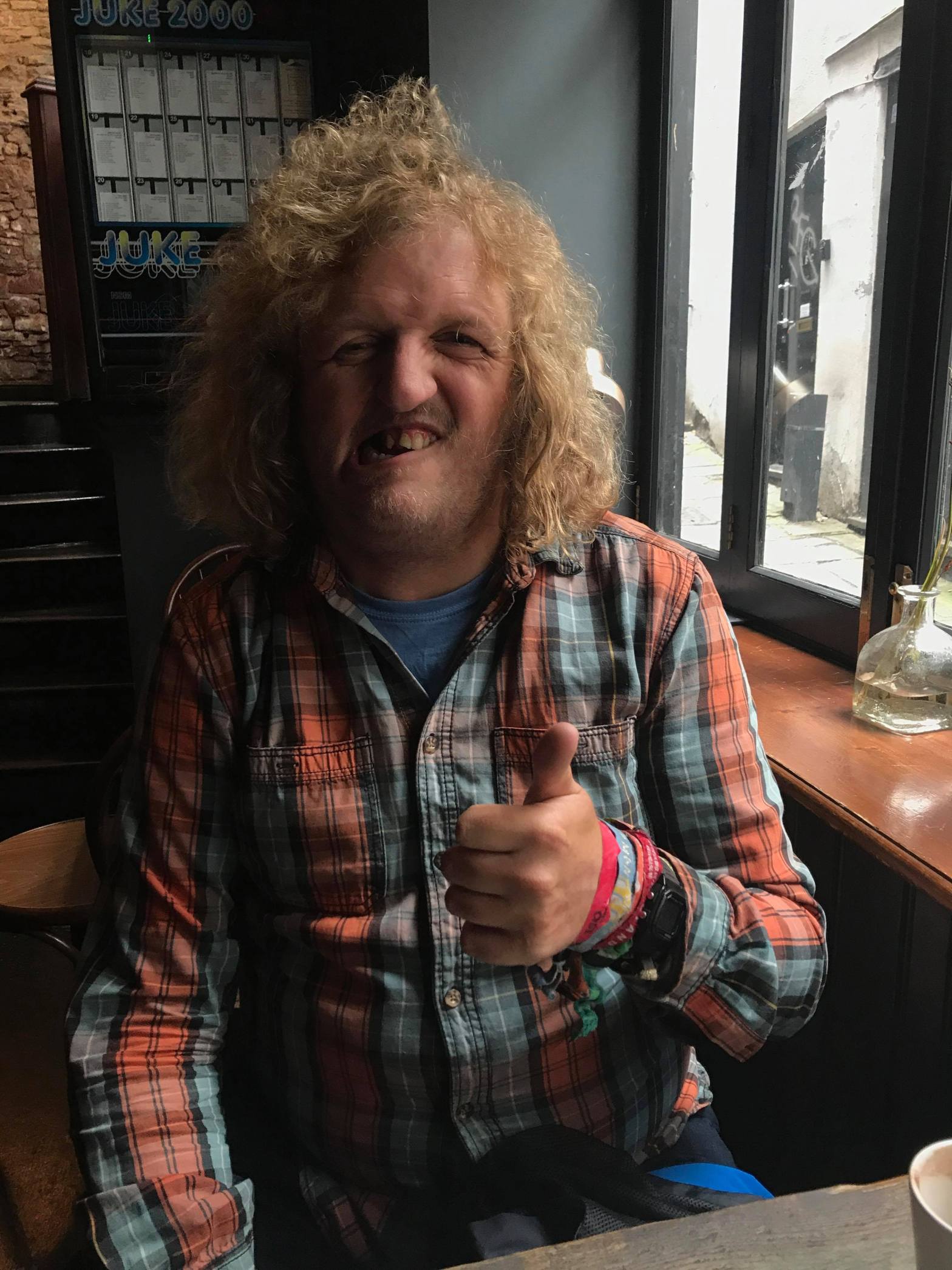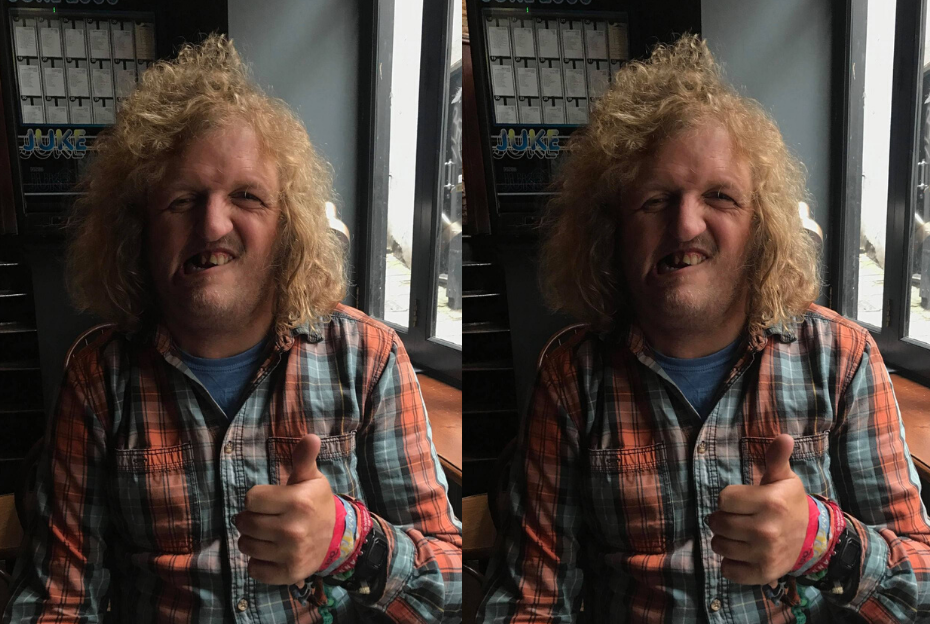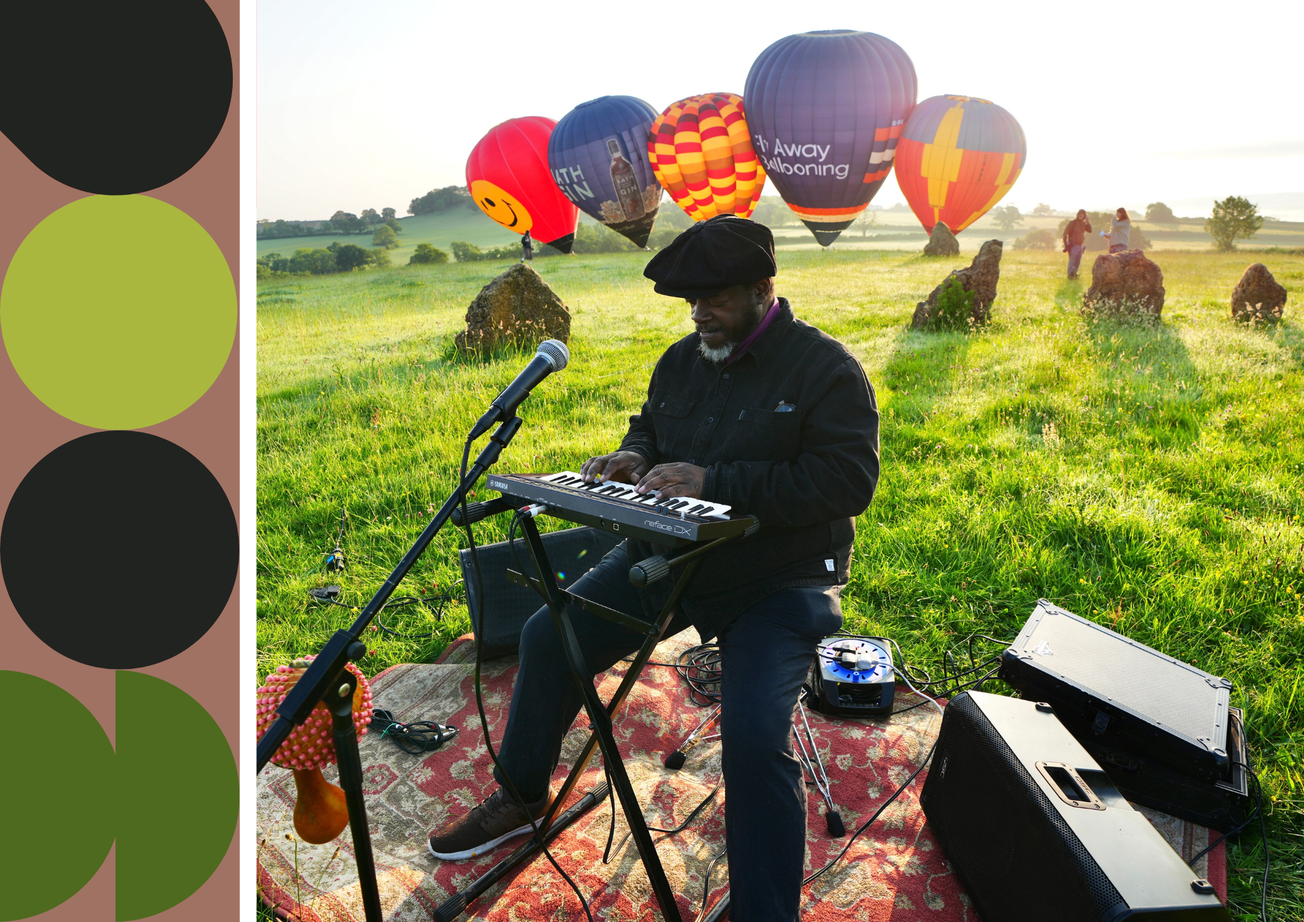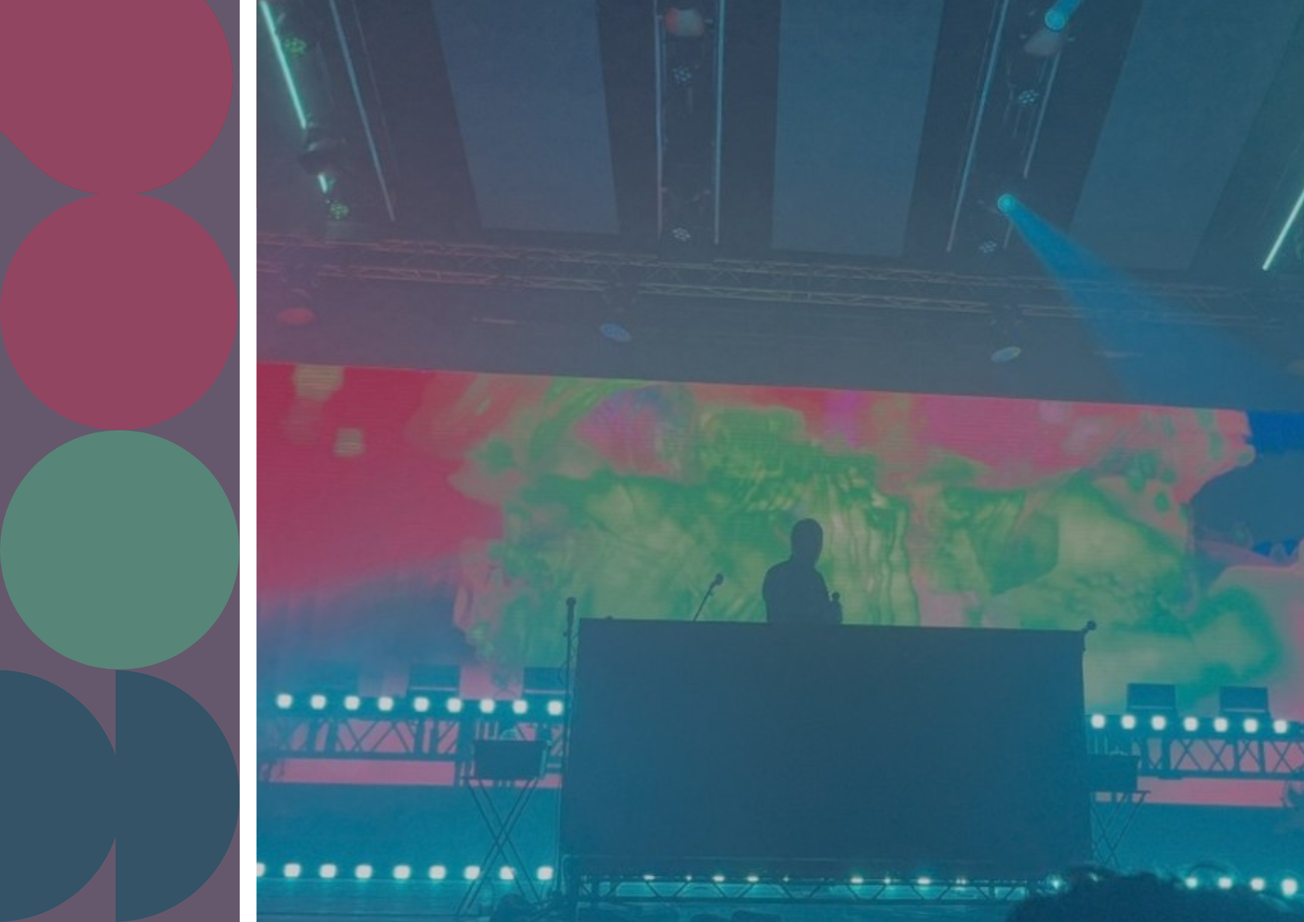By Kate Hutchison, Deputy Music Editor
Kate Hutchison invites Bristol gig legend Big Jeff to The Christmas Steps pub to chat new projects, mental health and HMLTD.
Big Jeff. You’ll know this name if you’re at all acquainted with the Bristol music scene. But even if you’re not familiar; chances are, if you’ve been to a gig in Bristol, you’ve been to a gig in Bristol alongside him, too.
If you’re still unsure, Jeff can be easily spotted. Most likely musically enthralled at a gig’s barriers, erratically jigging his curly locks, or juggling numerous conversations with his community of admirers between sets, Jeff carries a celebrity-likeness inside Bristol’s live scene.
To find out a little more about this infamous and revered gig fanatic, I invited Jeff to the Christmas Steps pub to chat about the scene’s evolution, his past and upcoming projects.

"My door is always open. If someone comes up to me with a creative opportunity – I’m going to take it.”
Jeff undoubtedly carries an encyclopedic knowledge about Bristol’s music scene, having been based here since the early 2000s. First, I ask Jeff about his experience of the scene to date. Jeff explains how the scene "has always been changing," meaning there lacks a specific sound to characterise it with. He talks with a sincere excitement for the rise of "the other side of Bristol music finally peeping its head over the parapet, and actually getting noticed." Jeff takes this to be the alt-scene, a derivative of bands such as LICE and IDLES, recently gaining national attention.
With Bristol being home to Livity Sound and Timedance, labels responsible for new and transgressive techno, I ask Jeff his opinion on electronic music. He tautologically holds: “If its good, its good. That’s my attitude."
"I much prefer acts like Giant Swan and Silver Waves who incorporate techno with a live element. There are still some very good tech people out there, and I’m not discrediting any of them, but I’ve always been more of a live person.”
“People do a lot more experimenting with the music in Bristol," Jeff continues. "You’ve got small labels like Solten Bodies who specialise in psychedelia; there’s stuff like Howling Owl who have been doing shoe-gaze/indie; Breakfast Records who specialise in lo-fi, indie sort of stuff. At the moment,it’s really exciting because there are so many new things starting up almost every week. Sometimes it is hard to keep on top of it all.”
Jeff and I speak a few weeks before the #savethekla campaign flooded the internet, the most notable and recent threat to Bristol’s live scene. However, Jeff is already well acquainted with the topic when we chat. Despite his excitement for the rich diversity of the scene, Jeff touches on why he takes it to be fragmenting.
“I think that’s partly because of housing prices - it’s more difficult for creative people to live in a big city like Bristol. Also, it’s running out of small, DIY spaces. We’re losing one of my favourite places, like Roll for the Soul. I never had a bad night when I went there. It is always such a warm place.”
Jeff’s knowledge of the scene and music is overwhelming. But I’m interested in Jeff himself; his likes, his dislikes, and his past. We start with his past, and how he came to be the Bristol music scene's familiar face. Jeff explains how The Louisiana was one of the first venues he became acquainted with. Does he still spend time there? Of course.
“The Louisiana will always have a soft spot for me. I think it's partly due to the fact it's a family-run venue. It’s a small, 140 capacity room – the sounds really good. I’ve stumbled across some really good bands there.
"When I first moved to Bristol, I wouldn’t really speak to anyone. I was very mute. I would find myself standing in front of all the posters [outside The Louisiana] obsessing about the bands coming up.”
Jeff’s popular; both on social media and in reality. It’s unusual not to see him immersed in some sort of discussion at a gig, but surprisingly, Jeff says he’s “terrible at approaching people,” and speaks candidly about his nervousness around others.
Taking this into account, I ask Jeff whether he finds his involuntary fame difficult at times, revealing a genuine humility:
“Sometimes I appreciate it, sometimes it can be quite tiring. There’s definitely been times when it has been a little too overwhelming. But on the back of that, I’ve also been allowed to do some really cool things which I never ever thought I’d ever end up doing – doing stuff like coordinating a day-long event at the Arnolfini."
This summer, Jeff curated a day-long event at the Harbourside’s art gallery, The Arnolfini, with the help of the main events manager, Hannah. Jeff explains to me how his struggles with face-to-face communication led to him formulate an A4 sheet filled with artists’ names he wanted to play.
“We managed to get together a really strong line up of people. It just was really emotionally overwhelming. I was overwhelmed by the number of people who showed up – especially to the free part of it. I was moved to tears.”
Again, Jeff's humility smacks you in the face, having not at all mentioned his own DJ set which happened that day. Jeff agrees he’s fond of DJing, and admits he’s got a few records which some“won’t have ever heard of before.”
Since our chat, Jeff has been on BBC Radio 6 to discuss new records, DJ’d at The Mothers’ Ruin, and had his own film screening. During our conversation, although hinting at further projects, they remain hush hush.
“Never say never," Jeff says. "There’s maybe one or two things in the pipeline, but I can’t really say yet because they haven’t been announced. My door is always open. If someone comes up to me with a creative opportunity – I’m going to take it.”
Jeff’s positivity toward life and music is infectious: even if no one in a crowd is moving, you can expect Jeff to be dancing to whatever music is blaring from the speakers. Jeff’s ability to appreciate an invariable amount of sound is indisputable – but I wanted to hear some critique. A music fan, surely, cannot be without tough evaluation? Luckily, Jeff isn’t an anomaly. I ask him if there’s any artist to whom his support won’t reach.
“There’s always going to be a few people I don’t like," Jeff explains. "I think there’s some bands that are overhyped."
I knowingly enquire as to who this may be, and without hesitation, Jeff responds, almost relieving him of some bottled up critique:
“HMLTD," he says. "Their music is vacuous. I’ve seen them a couple of times. The first time, I was like, 'ok – this is kinda fun,' at the Old England with LICE. The second time, I met some of them, and yeah – just not me."
And I agree. HMLTD are disingenuous. Their music doesn’t combine genre and previous work; it imitates it. Moreover, while their hyperbolic look has been tagged ‘individualistic,’ it stands to be quite a boring parallel of 80’s Romantics. In light of this, I ask Jeff whether he thinks music can be manipulated to become based on a look:
“Very much so. Image sells, doesn’t it? If you think about it, it’s what people sometimes buy into. It isn’t so much the quality of the songwriting, sometimes it’s the image and what it portrays. For instance, some of the punk bands. Some of it has always been sold on image. But then also, the bands that have lasted have been the bands who've had good songs."
Although Jeff doesn't accuse HMTLD of arrogance directly, his following comments reveal something close to it. When I ask Jeff about his thoughts on London, and more specifically, Brixton bands, he explains how politeness is key.
“If you’re polite to people and you're easy to get on with, then more people will actually connect with the music – I will connect. Whereas, if I find someone is a bit standoffish and arrogant, I will find a distance between myself and their music. If there is something which makes me feel negative about them personally, then it’s going to make me lose interest in what they’re doing creatively.
"I think being polite to people – it doesn’t harm at all," Jeff continues. "And also, if you’ve got a really positive work ethic – setting up your own gear, for instance – then more people are gonna like you.”
The interpersonal relationships Jeff has in and around Bristol, he has said previously, have helped him to deal with his mental health. So, it’s easy to appreciate why approachability inside the scene and open discussion with fellow music lovers is essential to him. Moreover, Jeff’s eagerness to talk about mental health seems fitting, given the University of Bristol's recent batch of funding for mental health services. When I mention the funding to Jeff, he expresses huge enthusiasm:
“I think it’s a great thing. There’s still a stigma which is very much underlying but its finally being acknowledged that these things exist and that sometimes, they can hold people back. Small steps, really. But it's small steps in the right direction."
Turning to Jeff himself, we discuss how Bristol and its music scene has helped him to overcome personal struggle:
“For me, music has been very therapeutic. I have found some music is basically very good for completely cleansing me – completely transformative. Also, its sometimes about going into small places, like The Louisiana. You’ll be in a social environment where you aren’t necessarily forced to speak to talk to people. You can just be there because there is something taking the centre of attention away.
"What’s happened with me – since getting the official diagnosis of being on the spectrum – something which I knew a long time before anyway – is that people have been talking about it a lot more. And that's one of the good things about social media: it has opened people up that way, using hashtags like #itaffectsme."
"It's gradually destigmatising it all, especially with male masculinity. It’s quite a difficult subject, sometimes, for men to speak about. Talking about things is the only way we’re going to get over the biggest young male epidemic, which is suicide.”
I was interviewed by the lovely Kate Hutchison for Epigram, it was a very nice little chat we had. https://t.co/Kd1NaqeAAb
— Jeffrey Johns (@BigJeffJohns) December 14, 2017







